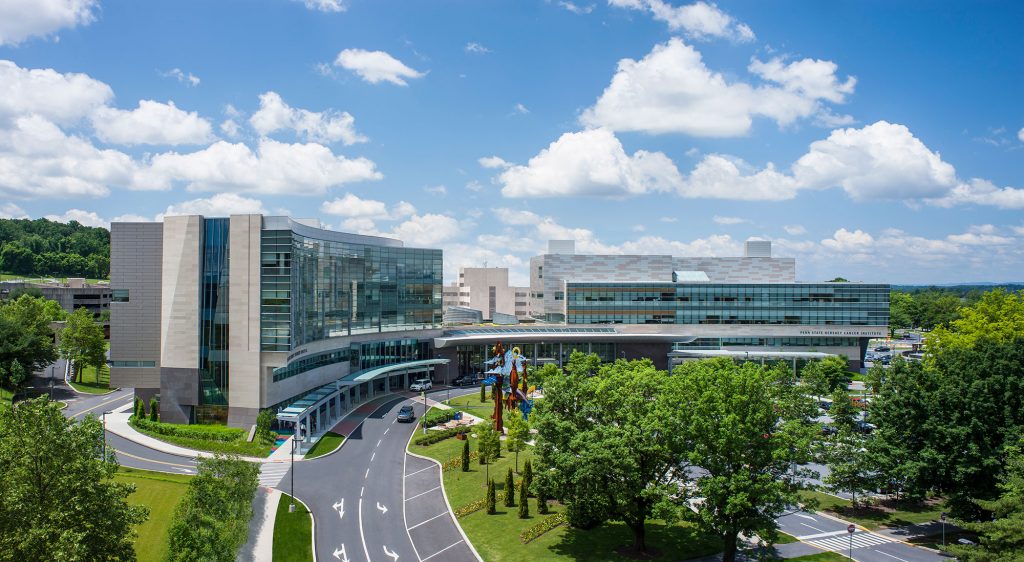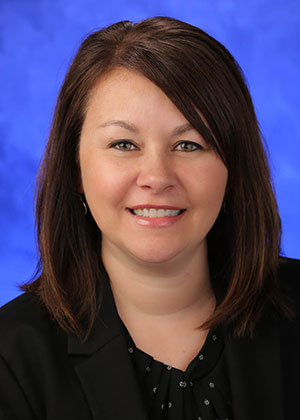Jump to topic
Search
Program Details
The Nuclear Medicine Fellowship at Penn State Health Milton S. Hershey Medical Center consists of a comprehensive curriculum in general nuclear medicine, positron emission tomography/computed tomography (PET/CT) and radionuclide therapy.
Nuclear medicine is the medical specialty that uses the tracer principle, most often with radiopharmaceuticals, to evaluate molecular, metabolic, physiologic and pathologic conditions of the body for the purposes of diagnosis, therapy and research. Commonly performed nuclear medicine studies include nuclear cardiac studies, bone imaging, hepatobiliary and gastrointestinal tract imaging, renal studies, thyroid scans and multiple types of tumor imaging.
PET/CT imaging is performed for oncology, neurology and cardiology applications. PET detects alternations in glucose metabolism that occur in neoplastic and inflammatory conditions. Merging the PET data to a concurrently acquired CT scan allows for sensitive and accurate localization of aberrant glucose metabolism throughout the body.
Nuclear medicine also performs comprehensive diagnostic evaluation and therapy for a number of endocrine conditions including hyperthyroidism and thyroid cancer.
Two new leading-edge radionuclide therapies – Radium Ra-223 dichloride (Xofigo) and yttrium-90 (90Y) SIR-Spheres microspheres – are offered by Penn State Health Milton S. Hershey Medical Center’s Nuclear Medicine service.
Radium Ra-223 dichloride, an alpha-emitting radioactive therapeutic agent, is indicated for the treatment of patients with castration-resistant prostate cancer that has spread to bones and is causing symptoms. Xofigo therapy consists of monthly injections of the alpha-emitting treatment agent for up to six months.
90Y SIR-spheres microspheres are approved to treat colon and rectal cancer that has spread to the liver. SIR-Spheres microspheres treatments are performed as an outpatient procedure by a specially trained team of interventional radiologists and nuclear medicine physicians.
Learn More about the Fellowship
All positions for the 2022-2023 academic year for the Nuclear Medicine Residency have been filled, and the program is no longer accepting applications.
Applications for the 2023-2024 academic year will be accepted beginning in August 2022.
Virtual Tour
Penn State Health
Penn State Health is a multi-hospital health system serving patients and communities across 29 counties of Pennsylvania. Its mission is to improve health through patient care, research, education and community outreach.
In December 2017, the system partnered with Highmark Health to facilitate creation of a value-based, community care network in the region. The shared goal of Highmark and Penn State Health is to ensure patients in the community are within:
- 10 minutes of a Penn State Health primary care provider
- 20 minutes of Penn State Health specialty care
- 30 minutes of a Penn State Health acute care facility
Learn more about Penn State Health

Penn State Health Children’s Hospital (left), Penn State Health Milton S. Hershey Medical Center (center) and Penn State Cancer Institute (right)
Penn State Health Milton S. Hershey Medical Center
500 University Dr., Hershey, Pa., 17033 (Derry Township, Dauphin County)
- The health system’s 647-bed flagship teaching and research hospital
- The only medical facility in Pennsylvania accredited as both an adult and a pediatric Level I (highest-level) trauma center
- Dedicated surgical, neuroscience, cardiovascular, trauma and medical intensive care units
- Accredited Life Lion critical-care transport providing more than 1,100 helicopter and approximately 750 ground ambulance transports per year
- More than 1,300 faculty members and more than 650 residents and fellows
- Approximately 29,000 admissions, 73,000 emergency department visits, 1.1 million outpatient visits and 33,000 surgical procedures annually
- Designated as a Magnet hospital since 2007
Learn more about Milton S. Hershey Medical Center
Penn State Health Children’s Hospital
600 University Dr., Hershey, Pa. 17033 (Derry Township, Dauphin County)
- An eight-story, 263,000-square-foot-facility built in 2013 and expanded in 2020
- 146 licensed pediatric beds, 18 acute care beds and a 56-bed neonatal intensive care unit
- Level IV (highest-level) neonatal intensive care unit
- Level I quaternary (highest-level) pediatric intensive care unit
- Level I (highest-level) pediatric trauma center designation
- Intermediate care unit
- Dedicated pediatric operating rooms
- More than 150,000 pediatric outpatient visits and approximately 5,000 pediatric patient discharges annually
Welcome to Hershey
More About Hershey
Interested in learning more about living and working in Hershey, Pa.? See details here:
Wellness, including emotional, spiritual, social and physical health, is a crucial component to training and to becoming a professional, compassionate and resilient physician. Self-care is a skill which must be continually practiced and reinforced. Penn State College of Medicine and Penn State Health are committed to addressing wellness among residents and fellows, with multiple resources readily available.
Institutional resources
- Visit BeWell – a health program designed to support Penn State Health employees
- See Penn State College of Medicine wellness resources here
- Employee Health Care Concierge and Case Management Service
- Partners in Medicine
Moving to a new city with your family does not have to be stressful. Residency programs have assisted many significant others with finding employment. There is also a GME-Wide Partners in Medicine (PIM) group that offers networking opportunities as well as various social and community oriented activities. - The Doctors Kienle Center for Humanistic Medicine
- Active and easily accessed Office of Professional Mental Health
Graduate medical education resources
Institutional Resources
Penn State Health and Penn State College of Medicine celebrate, embrace and support the diversity of all patients, faculty, staff, students and trainees.
Office for Diversity, Equity and Inclusion
In keeping with this, Penn State Health has an active Office for Diversity, Equity and Inclusion with various programs, networks and resource groups, including:
- Talks and lectures on diversity, equity and inclusion through the Inclusion Academy
- Regular events on topics such as eradicating racism and creating a culture of inclusiveness
- Many Business Employee Resource Groups (BERGs), including:
- Disability Business Employee Resource Group
- Interfaith Business Employee Resource Group
- LGBTQ+ Business Employee Resource Group
- Military and Veterans Business Employee Resource Group
- Multicultural Business Employee Resource Group
- NextGen Business Employee Resource Group
Learn more about the Penn State Health Office for Diversity, Equity and Inclusion
Learn more about the College of Medicine’s Office for Diversity, Equity and Belonging
Office for Culturally Responsive Health Care Education
The vision at Penn State College of Medicine and Penn State Health is to equip learners with the knowledge, skills and attitudes they will need to provide culturally excellent health care and research for an increasingly diverse U.S. population. The Office for Culturally Responsive Health Care Education was formed to help meet that goal.
Learn more about the Office for Culturally Responsive Health Care Education
Office for a Respectful Learning Environment
In addition, the institution does not tolerate discrimination, biases, microaggression, harassment or learner mistreatment of any kind, and any concerns are immediately addressed by the Office for a Respectful Learning Environment.
Learn more about the Office for a Respectful Learning Environment
Network of Under-represented Residents and Fellows
The Network of Under-represented Residents and Fellows (NURF) is a group of diverse residents and fellows representing all specialties. NURF’s goal is to promote cultural diversity in the residency programs through community involvement, mentorship with diverse faculty, professional networking and support for the recruitment of diverse medical students into the residency programs.
NURF is sponsored by the Penn State College of Medicine Graduate Medical Education Office and the Penn State Health Office for Diversity, Equity and Inclusion.
Mailing Address
Nuclear Medicine Fellowship
Department of Radiology
Penn State Health Milton S. Hershey Medical Center
500 University Dr.
P.O. Box 850, MC H066
Hershey, PA 17033
General Contact Information
Fax: 717-531-0006
Latest News from Radiology





